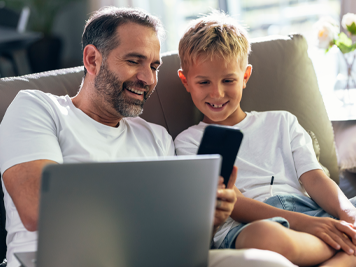Slander and reputational damage. Children these days are often quick to judge and let the world know about it via social media, yet they lack real-world knowledge of their post’s potential ramifications. Questionable photos and derogatory words not only put a child’s personal character at risk but also could potentially impact their parents’ reputation, relationship with clients, business activity, board affiliations, and more. Plus, your children’s inappropriate posts and pictures on social media can have long-lasting consequences, including impacting their future activities (scholarships for athletics, music, arts, etc.), educational, or employment opportunities.
Personal security. Children may unknowingly share personal information, such as their full name, address, or contact details, on social media platforms. They could even post that they are home alone or share pictures of your home and its high-value contents (large electronics, artwork, jewelry, etc.). This can make them and your lifestyle vulnerable to burglars and kidnappers, as well as online predators, traffickers, and identity thieves.
Cyberbullying. Social media and gaming platforms can be breeding grounds for cyberbullying, where children may experience harassment, threats, or humiliation from their peers. Cyberbullying is one of the more common issues we hear about today. Approximately 15% of children between the ages of 12 and 18 and more than 25% of teens between the ages of 13 and 15 have already been cyberbullied.
Inappropriate content. Children may come across inappropriate or explicit content while using social media platforms. This can have a negative impact on their mental and emotional well-being. If they share it with friends, it could also expose parents to additional liability risks.
Any of these risks could be a reason for someone to file a lawsuit—whether frivolous or not—against you or your family.
Protecting your family
Communication is the most valuable tool to protect your family from social media risks. Overall, it’s important to help your children understand social media risks, their actions, and teach them to be smart about what they say and post online.
These tips can also help guide your family conversations and minimize the risks many families face when posting or sharing summer vacation plans and other information:
- Review your privacy settings on all your family’s social media apps. Limit them to trusted friends and family members.
- Keep your personal information, such as birth date and address, off your social media profiles.
- Use private Internet connections. Even while traveling, it’s important to find connections that have secure settings.
- Disable location tracking or other location data being shared on your devices.
- Avoid sharing or posting specific travel plans, locations, and dates. It’s fun to share your travel plans, but it’s best to be vague.
- When sharing content, ensure you have the necessary privacy rights or property permissions and the consent of anyone else in the pictures.
- Wait until after your vacation to share pictures, minimizing the risk of becoming a target while away.
- Avoid “tagging” your current location or other people while you’re away—it opens them up to risks as well.
- Monitor your children's online activities, establish guidelines, use parental controls, and teach them how to handle and report instances of cyberbullying or inappropriate content appearing in their feed.
- Explain to your children the importance of not sharing pictures of your home, their current status (home alone), or plans to meet up with friends on their social media apps.
Lastly, arranging proper umbrella or excess liability insurance coverage can help your family avoid significant financial loss due to a potential misstep for many risks.



